 |
| June Millington (of Fanny) with Fanny: The Right to Rock director Bobbi Jo Hart, music producer and 99 Records founder Ed Bahlman and Anne-Katrin Titze: “What goes around, comes around.” |
Lincoln Center Presents American Songbook: Singer Outsiders (a nod to Audre Lorde’s Sister Outsider), co-curated by Tamar-kali and Kathleen Hanna will present Gossip and ESG: Honouring Fanny (on Sunday, April 6 at 7:30pm, Wu Tsai Theater, David Geffen Hall) with performances by ESG, led by singer/songwriter Renee Scroggins (come away with ESG, 99-003LP and 99-10EP, produced and mastered by Ed Bahlman, 99-04EP. produced by Martin Hannett and Ed Bahlman, all on 99 Records), and Gossip. In the afternoon there will be a free screening of Bobbi Jo Hart’s Fanny: The Right To Rock (at 3:00pm, LeFrak Lobby, David Geffen Hall).
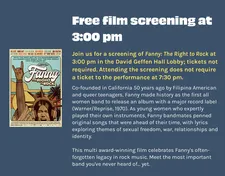 |
| Fanny: The Right To Rock free screening on Sunday, April 6 at 3:00pm |
Bobbi Jo’s spirited documentary takes us on the journey of the first all-female rock band (June Millington, Jean Millington, Brie Howard Darling, Alice de Buhr, Nickey Barclay) signed to a major label. From performance clips we hear and see the formidable talent of Fanny and through insightful on-camera interviews, including Bonnie Raitt, Kate Pierson (the B-52s), Todd Rundgren, Kathy Valentine (The Go-Gos), John Sebastian (The Lovin' Spoonful), Joe Elliott (Def Leppard), Gail Ann Dorsey, Earl Slick, Cherie Currie (The Runaways), and Fanny band members, including Patti Quatro, we learn about the determination it takes to overcome the pitfalls firmly in place of a music industry dominated by men.
Tonight, Friday April 4 at 7:30pm, Lincoln Center Presents American Songbook Tribute to The Slits (Ari Up, Tessa Pollitt, Viv Albertine, Palmolive), is hosted by Vivien Goldman (Dirty Washing, 99-05EP, 99 Records), featuring DJ: Marissa Neff and vocalists Felice Rosser, Honeychild Coleman, Rachel Dissident, Shara Lunon, Cleo Reed, Ashley Kossakowski, Rahill Jamalifard, Simi Stone, and Dunia Best, backed by Keyanna Hutchinson, Evan Lawrence, Elenna Canlas, and Drums: Muzikaldunk aka MD (David Rubenstein Atrium, Lincoln Center).
Last week, Lincoln Center Presents American Songbook honoured Poly Styrene, founding member of X-Ray Spex, with a tribute hosted by LaRonda Davis and a screening of Celeste Bell and Paul Sng’s Poly Styrene: I Am A Cliché.
 |
| Jean Millington, Nickey Barclay, Brie Howard Darling, Alice de Buhr and June Millington; Fanny rehearsing at Fanny Hill Photo: courtesy of Bobbi Jo Hart |
After ESG’s performance on Sunday night, the American Songbook Award will be presented to Fanny. Accepting the honour will be June Millington and Alice de Buhr.
From Montreal, Bobbi Jo Hart and from Goshen, Massachusetts, June Millington joined us for an in-depth conversation on Fanny: The Right to Rock.
Anne-Katrin Titze: Maybe we can start with how the two of you met, how this film came about. What's the origin story?
June Millington: I remember a phone call from you, Bobbi Jo, after you saw my piece in the Taylor [Guitar] magazine. They had a section of people of courage, and it was really an incredible article they put together. They put a lot of work into it, and you called me up, and you were just exclaiming: How did I not know of you? I mean, she just went on and on, and that is exactly what the film does to other people. They get that same reaction. So it's sort of a chain reaction that is never, actually ever going to end. To tell you the truth, I'm getting emails every day and comments from people on YouTube saying, how did I not know of you? I mean, I was alive then.
Ed Bahlman: I was alive, too, and I did not get exposure to Fanny at all. In New York City, it did not cross our path.
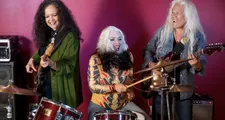 |
| Jean Millington with Brie Howard Darling and June Millington - Fanny Walked The Earth Photo: courtesy of Bobbi Jo Hart |
JM: Well, we played Max's Kansas City so many times, and Carnegie Hall. So I'll let Bobbi continue the story.
Bobbi Jo Hart: Yeah, I mean, as June was saying, I was on the Taylor Guitar website. They had an article there. I was looking for a guitar for my daughter and got distracted by this section, said stories, and went down that rabbit hole and just saw this amazing woman with this flaming gray hair wheeling this guitar. I just was riveted by the photo. At first of just this powerful woman rocking out. And then I read the story. I've realised over the years that what has led me to make a film is a combination of excitement about this incredible story, and being pissed off that I don't know about it.
I really do gravitate towards underrepresented stories, untold stories. And I try to just follow those stories to try to elevate them for more people to know about. And they're usually about women and in this case women of colour, queer women. There's so many layers. And then there's the layer of them getting a new rock record deal in their late sixties and still kicking ass in their seventies. There's so many layers of incredible representation through this story that deserve to be elevated. And it's so exciting to see that wave continuing. It's not just one wave. It's sets of waves that are coming now for Fanny, well deservedly, including this honour.
 |
| Kate Pierson holding up the Fanny Walked The Earth CD Photo: courtesy of Bobbi Jo Hart |
JM: A Russian doll, you know, unveiling the next thing, and it's always the same thing, but it always seems kind of bigger in some way. It means so much to people, and they are truly stupefied. And I find that really gratifying, because we were such hard workers, and we knew we were doing good work, and we knew we were getting better all the time. Our goal wasn't necessarily to get better than the boys, but in fact, it did become that because they kept trying to kick us to the curb, and the better and louder we got, the less they could actually do that.
Every band that we opened up for, and usually we were the opening act, we sometimes were the main act, but the bands would be watching us from the side of the stage, and so the word about us spread through the music world on the street. Like, hey, you got to check out these chicks. And then everyone who was in LA figured out where we were living, so they try to come over and jam with us and try to be better, you know. And so we really had to take that in stride, but we worked so hard we just got better and better, and finally we just mostly outstripped them
EB: Did you travel with a sound person on your tours? You had someone who knew what you wanted?
JM: Yes, and most especially our roadies, really.
EB: Perfect, because opening acts tend to not get the main soundboard. You had that issue also?
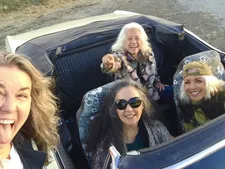 |
| Bobbi Jo Hart, Jean Millington and June Millington with Brie Howard Darling driving the convertible Photo: courtesy of Bobbi Jo Hart |
JM: You know, that's always a push and pull, even if you have a sound man a lot of times he's got to deal with whoever is at the hall who's got the power. But I would say we were really well taken care of on that level. We had good roadies. We had typically a sound man with us, and we did long sound checks. I remember, we were on tour with Chicago, and we would do these really long sound checks at every gig, and they wouldn't even show up. Their guys would just do line checks.
So finally I asked Peter Cetera, I said, why don't you do sound checks? And I was just so baffled that he said it doesn't really make any difference, because the room changes so much. Because they got such huge crowds. The sound's going to change, anyway. So we just have our guys do the line check, and then we walk up. We start playing. We change it on the first song, whatever we need.
And I was like, yeah, I mean, that makes a lot of sense. But we didn't feel like we could take that chance. We wanted to make sure that we sounded as good as possible, and we're as tuned up as possible, and all that kind of stuff.
AKT: You mentioned your house in Los Angeles, Fanny Hill, which has a wonderful history. It had belonged to Hedy Lamarr, of all people, a woman who was considered the most beautiful woman of her time, but her inventions, all of her other qualities were not really acknowledged.
JM: Well, it made the house very electric!
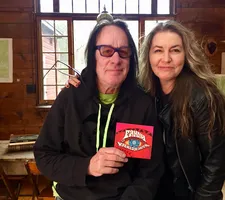 |
| Todd Rundgren holding up the Fanny Walked The Earth CD with Bobbi Jo Hart Photo: courtesy of Bobbi Jo Hart |
AKT: Great way to put it.
JM: That was part of it in the beginning, but I realised that later. Oh, no wonder it for me in particular, as a guitar player, was tremendously electric.
AKT: Bobbi Jo, did you ever try to get to the house and film there?
BJH: Yeah, we did. We actually were in the house with Brie [Howard Darling]. We went back and filmed a scene with Brie and her granddaughter. The woman that was living there let us in the house to film. But that scene with her granddaughter ended up getting cut from the film because all the other bandmates were not there.
JM: It was a difficult time, because Jean [Millington] had already had her stroke. That was unfortunate. Because you kind of need to have Jean in that house with you to get the vibe. But it did look beautiful, and it did remind me of some of the photos of the band.
Absolutely gorgeous house. I'll never forget Bonnie Raitt, the first time she came to L.A., she called me up and asked me if she could stay with us, and of course I said yes, and she stayed in Jean's room downstairs. We were upstairs, which was where we typically rehearsed in that phase, and the floor was just so beautiful, sandstone. And she had an appointment for someone at Warner Bros. to come interview her at our house. She and I were standing there.
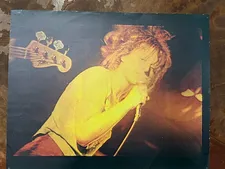 |
| Ari Up performing with The Slits in London, 1077 Photo: Ed Bahlman |
And the Warner Bros. guy comes, and it's all sunlight, and it's all beautiful. And it was really like a perfect rock and roll moment. As far as I'm concerned, she and I were really pretty much the only women at the time who were really kicking the jams out, and so we were just relaxed and hanging out, and we were both with Warner Bros., and it felt like a real home. I mean it was a home scene; we were welcoming this guy to our house that Bonnie was at, and we were all hanging out and very comfortable.
It wasn't so much business all the time. It was really our house. That was where we lived. That was where our headquarters was, I mean Jean and Alice [de Buhr] and Nickey [Barclay] didn't live there all the time. I'm the only one who lived there, till I left, but we were there every day, even after they moved out, because we were rehearsing and working and writing. We were busy.
AKT: You did go back to the place where you practiced even earlier, didn't you, in the film? The backyard in Sacramento?
BJH: Yeah, that was at your home, your family home in Sacramento.
JM: Yeah, that was Sacramento, we practiced in the backyard in our early band, The Svelts. So that would have been the Mid-Sixties. And people loved it. We loved it. People would come around from blocks and blocks. There'd be hundreds of people listening to us. And so that was kind of fun. You know, we knew we could attract attention, and we could handle it. That's the thing. You got to be able to handle that type of energy.
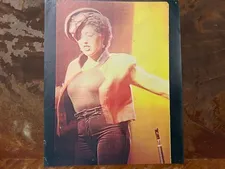 |
| Poly Styrene performing with X-Ray Spex in London, 1977 Photo: Ed Bahlman |
AKT: There is one photograph with you, June, and your sister and a lion cub!
JM: That was McClatchy High School. The lion is our mascot [Joan Didion was the editor of the student newspaper, The Prospector, in the 1950s].
AKT: I thought, okay, you were performing with a lion with a guitar? It looked very real.
JM: No, no, it wasn't a real lion, it was our mascot.
EB: The time period was just about the time of Motown. It was mentioned that you did Motown cover songs?
JM: And The Youngbloods and The Beatles had just started to come out in ’64 and The Rolling Stones. So did The Kinks, I mean, my goodness! The first big gig we did was with The Kinks at Santa Monica Civic [Auditorium] and they were doing Lola. So that was probably around 1970 or early ’71. And so we played really with pretty much all the bands that were coming up, or who had already had a hit like Steppenwolf. We did a gig with Steely Dan that I don't remember. But Skunk does.
EB: Did you see the Steppenwolf documentary [Born To Be Wild: The Story Of Steppenwolf, directed by Oliver Schwehm]?
JM: I think I did. Yeah.
 |
| Gossip and ESG: Honoring Fanny and Fanny: The Right To Rock screening will be held in David Geffen Hall, Lincoln Center on Sunday, April 6 Photo: Anne Katrin Titze |
EB: Really good. I didn't know that John Kay was from Germany. That was a real shock to hear that. The truth about you coming along too early is very much so, because when the Mid-Seventies started to happen, all these independent labels started. And when I started 99 Records in 1980, you would have fit so much better with an independent label because you would have total control. And you wouldn't have had to go against the people who were trying to break you.
JM: There were a lot of pressures and a lot of nuances coming from different sides of the spectrum. When we were in England, for example, we were appreciated in a completely different way than we were here in the US, which was much more of a put down. In Germany and Britain and Ireland they understood us in a completely different way, maybe because they're older countries.
And their technology was so far ahead of ours, but we really noticed how much they embraced us immediately, despite all the cackling about the name Fanny. We had no idea what fanny meant in Britain. So that was a shock to us. It was a shock that people actually still kind of put us down for it. But that can't be helped.
BJH: But you can turn that on its head, too, and it's just like the Women's March, all the pink pussy power hats. You can spin that.
JM: What goes around, comes around.
EB: Kate Pierson loving that double entendre with the name [when Fanny goes to England]!
JM: Absolutely, absolutely.
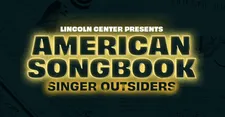 |
| Lincoln Center Presents American Songbook Singer Outsiders |
EB: Getting John Sebastian, that was a good one.
JM: He's a good friend, and we used to open for John. Then he'd come on with his acoustic guitar and his harmonica, and he would just blow the audience away. That was another really cool gig where you could see John admired us, but he could hold his own as an artist, and learn from that, when you see that type of confidence and that kind of knowing. He didn't resent us at all. He loved us, but he was John Sebastian, so he did his thing, and people loved it.
EB: His humanity came across in his performances.
JM: Yep, yes!
EB: You could feel it. I met him up in Woodstock, way back when that was the place people were hanging out.
BJH: Yeah, he performed with Fanny in Woodstock at the Woodstock Film Festival. He came on stage with them because they performed after the premiere there.
JM: That's a lot of connection, I mean. Todd Rundgren was there, too.
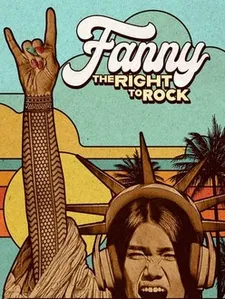 |
| Fanny: The Right To Rock poster |
EB: I was going to ask you, how did you hook up with Todd as a producer?
JM: We were auditioning producers after Richard [Perry at Warner Bros.], and we chose Todd. Because of Hello It's Me [1972]. We loved that production so much. So we went with him.
AKT: I have to compliment you on what you chose for the girls performing at the Institute for Musical Arts [co-founded by June with Ann Hackler] in the film. It's touching when they sing “We're not going to stop…
BJH: “I’m not gonna stop resisting!” Yeah, that was very powerful.
EB: I had tears in my eyes.
BJH: How timely is it now!
AKT: Early on in the documentary, June, you bring up how girls are supposed to ask permission to do anything. And there's still that asking for permission somewhere in their voices a little bit, and then they're breaking through. It's beautiful.
JM: You know, in real time I do try to break them of that in little ways. For example, I don't know if you noticed, but a lot of girls try to answer a question with their answer sounding like a question. So you say, what's your name? [And they respond:] Barbara? And I really train them not bringing their voice up. Declare it! Barbara, you are Barbara! And they get it. They get it after we spend all week doing that. It changes them, and you could call it a small thing, but it's such a tell and you're able to break them of that, or they're aware of it, and they're breaking themselves in slowly. It's very powerful.
EB: We're looking forward to seeing you.
JM: Looking forward to seeing you there. It's so nice of you to take the time to speak with us!
EB: Congratulations!
Coming up - Bobbi Jo Hart with June Millington and Ed Bahlman on meeting both June and her guitar in pyjamas, women and men’s relationship to their instruments, a chance spotting in Washington DC, 2017, filming the recording of the Fanny Walked the Earth album, what is an all-female band, knowing how to dress for Fanny and the changes imposed on them, being introduced by Kenny Rogers on his show, celebrating Bakunawa with Ruby Ibarra, and a potential Fanny musical for Broadway.





















